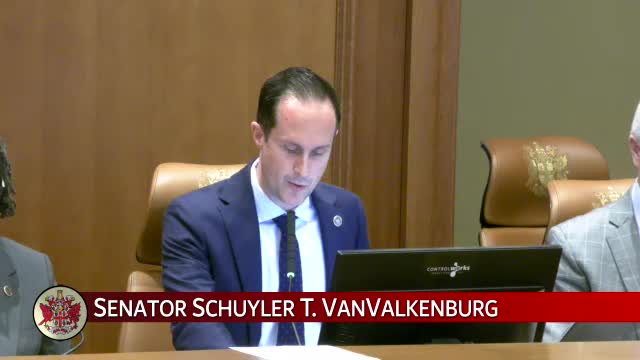Virginia subcommittee recommends bills restricting participation of biological males in female school sports
Get AI-powered insights, summaries, and transcripts
Subscribe
Summary
A Senate subcommittee on education voted 3–2 to recommend two bills that would bar biological males from participating on teams designated for females in K–12 and public college athletics.
A Senate subcommittee on education voted to recommend two bills intended to restrict participation of biological males in girls’ and women’s school sports in K–12 public schools and at public institutions of higher education.
Senator Patricia Mulkey, sponsor of Senate Bill 749, told the committee the bill would require school-sponsored athletic teams to be expressly designated by “biological sex” and require a signed physical statement as proof of a student’s biological sex. “The bill would stop biological boys and men from playing in women’s sports,” Mulkey said in her opening remarks. Senator Charles Peake offered a similar bill, Senate Bill 1079, limited to the K–12 level.
Proponents who testified said the bills are meant to protect female athletes. Dr. Sheila Furey, a physician, told the committee that biological differences in muscle and bone mass and cardiorespiratory capacity justify separate competition. Parent speakers described injuries and lost opportunities they attributed to competing with biological males; Laura Winn, a parent from Virginia Beach, recounted a collegiate exhibition in which her daughter was struck in the face by a ball while competing against a male athlete.
Opponents said the bills would bar transgender students from participation and are unnecessary where governing bodies already have policies. Nurse Erhmann of Equality Virginia said the Virginia High School League (VHSL) has had a policy for about a decade and that only a small number of students use the VHSL appeal process. Wyatt Rollam of the ACLU of Virginia argued the bills would create barriers to extracurricular participation and conflict with federal court precedent in some cases. Chad Stewart of the Virginia Education Association said the bills would restrict students’ access to activities and noted the collective impact on school culture.
Senator Lynne McCarthy moved to pass SB 749 indefinitely; after debate the motion to recommend passage (i.e., to advance the bill) passed on a 3–2 vote. The committee later took up SB 1079; Senator Peake explained his bill is restricted to K–12 and said past incidents in other states motivated the measure. The committee recommended SB 1079 by the same recorded margin, 3–2.
The bills as presented would authorize civil actions by students who claim they lost athletic opportunities. Committee discussion included questions about how biological sex would be determined; sponsors and several supporters pointed to physical exams and birth certificates as sources of verification. The bills do not create criminal penalties.
What’s next: Both recommendations send the bills to the full Senate committee for further consideration. The bills drew sustained public testimony from advocacy groups, parents, medical professionals and education groups.
Ending: The votes were the most divisive of the session; committee members and public witnesses framed the debate around fairness and safety on one side and nondiscrimination and existing review processes (VHSL appeals) on the other.
